You are incredibly prolific. Do you have a daily writing schedule? Or does it vary from day to day? Tell us about your writing process.
To be a writer, one must behave as writers behave. They write. And write. And write. The difference between a writer and a wannabe is that a writer is someone who can’t not write, while a wannabe says, “One of these days when . . ., then I’ll. . . .” Unable not to write, I write almost every day.
I write whenever I can. Genetic and environmental roulette has allowed me to work in either a silent or a noisy environment. I’m a speaker as well as a writer, so phone calls and faxes and e-messages chirp and hum and buzz in my writing room, and I often have to answer them during those precious morning hours. That’s all right with me. Fictionalists shut the world out. Fictionalists live with their imaginary characters, who get skittish and may flee a noisy room. As I cobble my essays, my readers are my companions, and they will usually stay with me in my writing space through outerworldly alarms and excursions.
Despite your deep and inherent love of words and language, you set out to go to medical school and then law school/ What sent you in other directions before you decided to become a verbivore full time?
My father and mother had sixth- and tenth-grade educations, so, quite understandably, they wanted me to be a doctor or a lawyer. As a premedical; student at Haverford College and then a law student at Harvard, I found myself reading the chemistry formulae and law cases for their literary value.
Luckily, I heard the call of “It’s the language, stupid” and became an English major and English teacher. In my books, radio broadcasts, and performances, I celebrate language as the hallmark of the human experience. I believe that not only do human beings have language; we arelanguage. I’m a special fan of the English language – the most widely spoken tongue in the history of humankind, possessing the most prodigious and democratic vocabulary and, at the same time, the wiggiest spelling and zaniest contradictions ever concocted. I love playing with a language in which you drive in a parkway and park in a driveway — and your nose can run and your feet can smell.
Your public speaking calendar is as full as your publication list. How does your writing feed your speaking and your speaking feed your writing? (Or is it all feeding your teaching?)
Samuel Johnson, who gave us the first great dictionary of the English language, wrote, ““I am not yet so lost in lexicography, as to forget that words are the daughters of earth and . . . the sons of heaven.” I am a writer who joneses for frequent contact with people, and I’m a speaker who learns a lot through such contact and joneses to transfer that learning to print.
And yes, it is all teaching. Teachers are compulsive sharers, and I want to share what abilities I may possess in every way that I can—print, radio, TV, and in public forums.
Check back May 15 for Part II


Elena always corrals the wild ones. This time no exception.
You magicians of language always amaze me!